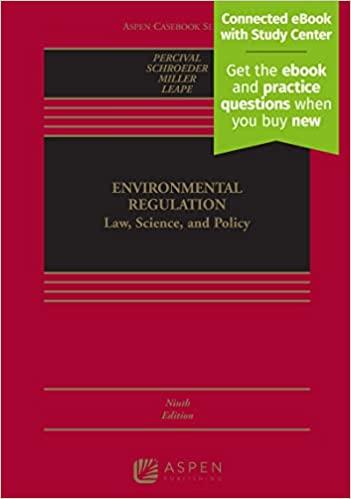Question
A. Write TRUE if the Statement is LEGALLY CORRECT and FALSE if the Statement is LEGALLY WRONG. 1. Should the vendor have reasonable grounds to
A. Write TRUE if the Statement is LEGALLY CORRECT and FALSE if the Statement is LEGALLY WRONG.
1. Should the vendor have reasonable grounds to fear the loss of immovable property sold and its price, he may immediately sue for the rescission of the sale.
2. If a buyer a retro retains the property although a redemption has been made, he shall be liable for damages such as rentals for the continued use of the property.
3. A seller a retro has the right to redeem the property from persons other than the buyer a retro.
4. If it is the duty of the seller to send the goods to the buyer - the delivery of the goods to the carrier by the seller constitutes as delivery to the buyer.
5. The right of legal redemption is substantive.
6. Bona fide tender of the redemption price of the consignation of the said price in court is essential in an action to redeem a parcel of land.
7. Legal redemption can be effected only against immovable property.
8. The vendee is bound to accept delivery and to pay the price of the thing at the time and place stipulated in the contract.
9. The creditors of the vendor cannot make use of the right of redemption against the vendee, until after they have exhausted the property of the vendor.
10. If a realty owner is delinquent in his payment of taxes on the real property, and it is sold he has the right to redeem said property.
11. If a property has been petitioned, a former co-heir has the right of redemption.
12. If the purchaser is a co-owner, there is no legal redemption.
13. If the buyer refuses without just cause to accept the delivery - title passes to him from the moment they are placed at his disposal, unless there is stipulation to the contrary.
14. The basic right of a buyer when the goods are delivered to him is to examine the goods.
15. The provision on equitable mortgage is also applicable in a contract purporting to be an absolute sale.
16. When the buyer has not examined the goods prior to delivery, he is not deemed to have accepted the same until and unless he has had a reasonable opportunity to examine them.
17. If several persons, jointly and in the same contract, should sell an undivided immovable with a right of repurchase, none of them may exercise this right for more than his respective share.
18. There can be conventional redemption even if it was not stipulated in the contract of sale since the right to redeem is presumed from the provisions of law.
19. In the absence of a written notification of the sale by the vendor of an urban land subject matter of legal redemption - the thirty (30) day period cannot be said to have even begun to run.
20. A delinquent payer whose property is sold by the government is not entitled to recover the fruits that had accrued before the property is finally redeemed.
21. As a rule, the buyer of goods is bound to accept delivery thereof by installments.
22. The buyer a retro is entitled to be reimbursed for land taxes because these taxes are considered as expenses on the property.
23. In legal redemption, co-owners are preferred over adjoining owners.
24. In a sale with pacto de recto, the inadequacy of the price cannot be considered as ground for rescinding contract.
25. There can be automatic rescission in the sale of both movable and immovable objects.
B. Start your answer with either "YES" or "NO", IF APPLICABLE to be followed by your LEGAL REASON/S. Answers should be brief and direct to the point. Do not repeat the question. Both your INITIAL ANSWER and your LEGAL REASON/S must be correct.
Alex, Bart and Charlie are co-owners of a small urban land, they having inherited the same from their wealthy aunt. Dante owns the adjoining land. Charlie donated a portion of the land that he co-owns with Alex and Bart to Excel, and Bart sold his portion to Ferleine.
a. Has Dante the right of redemption with respect to the portion of Bart? Explain.
b. In case both Alex and Dante want to redeem the portion of Charlie, who is the preferred first, the co-owner of the owner of the adjoining land? Explain.
C. Answers should be brief and direct to the point. Explain your answer.
Bart sold a parcel of land to Vhee for P400,000.00. In the Deed of Sale, it was expressly stipulated that "at any time after the expiration of nine (9) years to be computed from August 1, 1992, the vendor, his heirs or successors-in-interest has the option and priority to purchase the land for the consideration of P400,000.00." On August 2, 2001, the heirs of Bart commenced an action against Vhee to compel the latter to reconvey the land to them pursuant to the contractual provisions of the afore-quoted Deed of Sale. Vhee stands squarely on the proposition that the stipulation in the contract giving the vendor, his heirs or successors-in-interest the "option" to purchase the land is void and contrary to law, particularly Article 1606 of the Civil Code.
a. Rule on the contention of Vhee citing legal reasons.
Step by Step Solution
There are 3 Steps involved in it
Step: 1

Get Instant Access to Expert-Tailored Solutions
See step-by-step solutions with expert insights and AI powered tools for academic success
Step: 2

Step: 3

Ace Your Homework with AI
Get the answers you need in no time with our AI-driven, step-by-step assistance
Get Started


